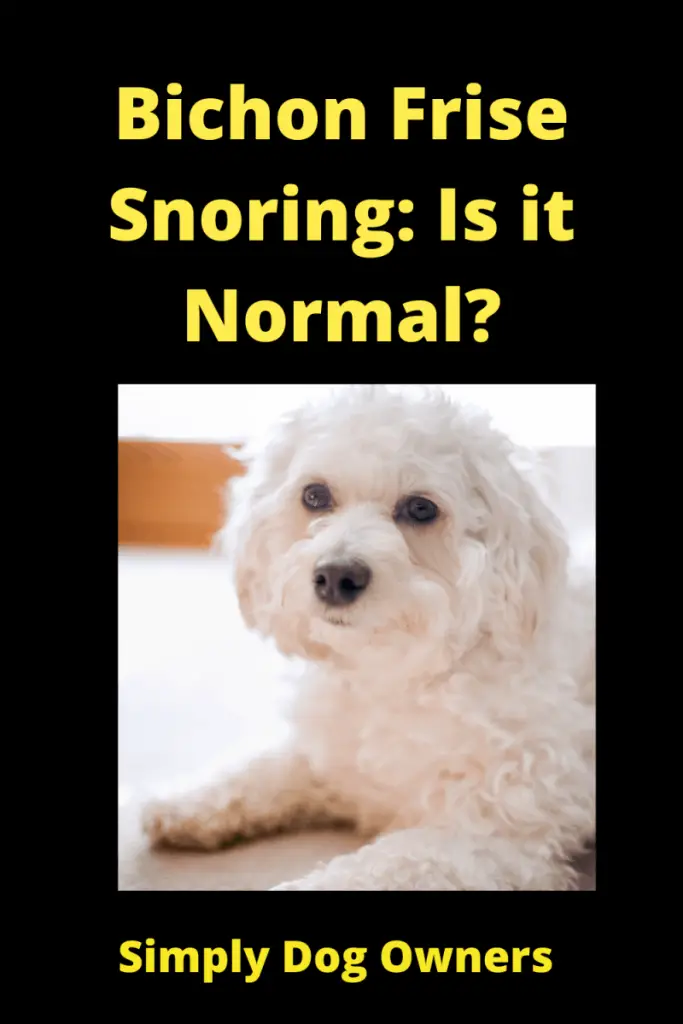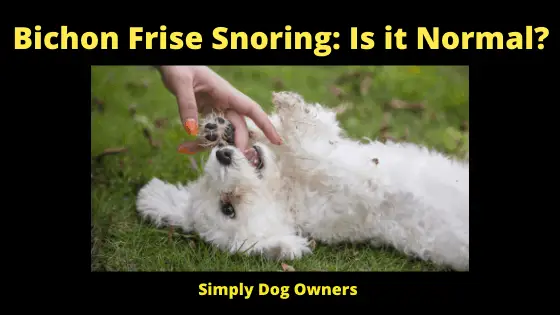Why is My Bichon Snoring
Bichon Frise is an adorable, playful, gentle and affectionate breed of dogs. It does not weigh more than 14 pounds.
Bichon Frise is famous for long sleep habits and yes! They snore for long hours. Owners usually enjoy their snores as the breed is fluffy and cute. But sometimes owners ask is this normal to snore for prolonged hours.
Let’s go a little bit deep into it and apprehend the snoring. Some breeds of dogs are vulnerable to the respiratory problem at a higher rate as compared to dogs with the elongated and bulged muzzle.
Physiological and Anatomical causes of Snoring:
Punched faced dogs tend to have warped nostrils which tend to block the air entering into it. Nostrils collapse when brachycephalic dogs like Bichon Frise breathe in thus producing a louder sound.
These dog breeds possess elongated and flap like soft palate which also hinders the air in the same way arising in snores and wheezes. Third, there are bulged out tiny pouches called saccules which also block the airflow.
These are some anatomical hindrances in nasal airflow which leads to these types of respiratory sounds in the punched muzzle or brachycephalic dogs.
Your Bichon Frise is snoring due to these obstructions normally. However, if these sounds surge to a higher or increased level, there might be something fishy going around your Bichon Frise. What might be the reason, let’s further probe into it?
Reasons Behind Enhanced Snoring
There might be some other kind of obstruction. It may be a small piece of wood or a toy. Your Bichon Frise might catch it up while playing. There may be some irritation due to some allergy.
It might be due to dust, pollen, and a companion pet. There is a possibility that your Bichon Frise has caught up some extra weight in the form of excessive fat tissues which also leads to the collapse of airways while sleeping.
Has your Bichon Frise some medication and disease history? Have you administered some painkillers or muscle relaxants? It leads to excessive relaxation of smooth muscles which tends to block the air passage.
Dental malformations, overgrowth, and infection may also add up some extra and louder snores. Some abnormal growths may be present. Do you smoke? Your Bichon Frise may be subjected to passive smoking. Exhaled smoke leads to the development of respiratory problems in your pet. You may also call it second-hand smoke which may be a cause of some louder of prolonged snores.
Have you heard the term aspergillosis? It is a fungus that causes an infection which may add some snoring and sneezing. Your Bichon Frise might catch it from dust, grass, or hay.
It is also possible that your Bichon Frise has caught cold like normal humans. It may add up some exudates causing congestion. This blockage may also be a cause of snoring.
Snores might also be the result of sleeping posture. Does your Bichon Frise sleep with his legs up? Or he curls himself while sleeping? Dogs sleeping on their back tend to snore more and louder.
How to Manage Snoring in Bichons?
So far, you might have better apprehension about normal or abnormal snoring. Either there is a need to visit the veterinarian or not? There are some measures which you can take on your own to manage and alleviate snoring.
Physically active dogs tend to have less fat deposits in their body. If you have an older Bichon Frise then you need some extra care. Half an hour to one hour walk will help a lot to reduce the fat flaps around the airways which are jamming the airways.
Playing in a park is more beneficial. Usually punched faced dogs are more prone to brachycephalic syndrome but your Bichon Frise is least prone to it.
Still, you should visit your vet for any serious obstructions which can only be removed through surgery to avoid some serious complications in the future.
Observe for the signs of cold and take some extra care for the fluctuations in the environmental temperature. Either it contains mucus or any blood. Oral hygiene and teeth integrity must be observed at regular intervals.
Any broken tooth or swollen gum must be observed. You will realize a need for the vet if required. Make them clean and habitual to chew toys.
Sleeping position is also something you may try at home. Sleeping on the belly with paws and head straight is the best position. But your Bichon Frise may resist to any change in the sleeping posture.
Carpets, rugs and cushion catch dust and allergens. They need regular spinning in washing machines. Keep an eye on the humidity or moisture levels in the air. Dry air irritates the nasal mucous membrane more.
You can humidify the air on your own. Steam producer, humidifier, wet cloth and water containers with the broad surface area may be placed in the surroundings of sleeping Bichon Frise.
If you smoke, quit it. It is good for you and your Bichon Frise, both. Do it outside the house to reduce the contact of your Bichon Frise with smoke.
Avoid busy roads for a walk. The pollen count in the environment should be kept in view through some authentic source i.e. newspaper or weather reports. Avoid walks early in the morning or at times with enhanced pollen counts.

Your Bichon Frise may react to any herbal or homeopathic preparation if you do it at home on your own and without concerning your vet. If your Bichon Frise needs some painkiller or tranquilizers, inform your vet about the concerns you have with heavy snores.
Conclusion
Last, but not least, you may stay away from your Bichon Frise while he sleeps. If you are intended to buy a Bichon Frise, learn in the first place that it snores you can check out the easy items above first.
